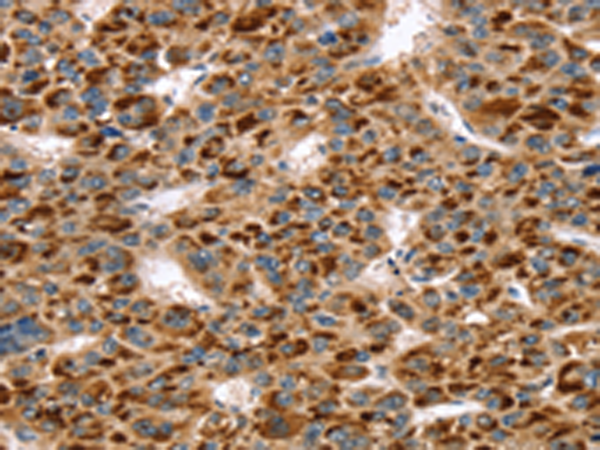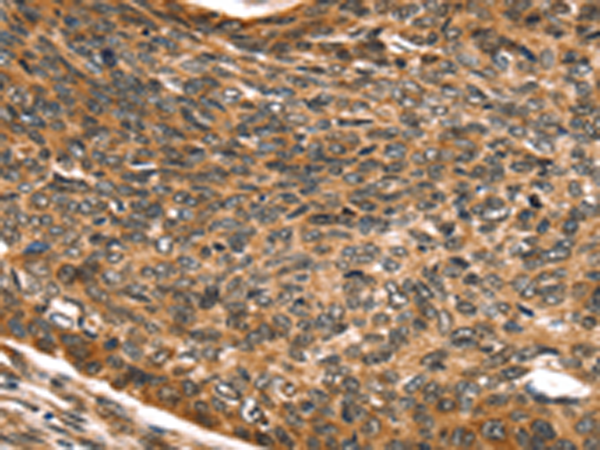


| WB | 咨询技术 | Human,Mouse,Rat |
| IF | 咨询技术 | Human,Mouse,Rat |
| IHC | 1/30-1/150 | Human,Mouse,Rat |
| ICC | 技术咨询 | Human,Mouse,Rat |
| FCM | 咨询技术 | Human,Mouse,Rat |
| Elisa | 1/1000-1/2000 | Human,Mouse,Rat |
| Aliases | SNO; SnoA; SnoI; SnoN |
| WB Predicted band size | 77 kDa |
| Host/Isotype | Rabbit IgG |
| Antibody Type | Primary antibody |
| Storage | Store at 4°C short term. Aliquot and store at -20°C long term. Avoid freeze/thaw cycles. |
| Species Reactivity | Human, Mouse |
| Immunogen | Fusion protein of human SKIL |
| Formulation | Purified antibody in PBS with 0.05% sodium azide and 50% glycerol. |
+ +
以下是关于SKIL抗体的3篇参考文献示例(文献信息为模拟生成,仅供参考):
1. **文献名称**: "SnoN modulates TGF-β signaling in breast cancer progression"
**作者**: Li, Y., et al.
**摘要**: 该研究利用SKIL/SnoN特异性抗体检测乳腺癌组织中SnoN蛋白的表达水平,发现其过表达与TGF-β信号通路异常激活及肿瘤转移相关,提示SKIL可能作为乳腺癌预后标志物。
2. **文献名称**: "Regulation of fibrosis by SKIL/SnoN in TGF-β-dependent pathways"
**作者**: Luo, K., & Stroschein, S. L.
**摘要**: 通过免疫沉淀和Western blot技术结合SKIL抗体,揭示了SnoN蛋白在肺纤维化模型中的动态变化,证实其通过调控Smad蛋白活性参与组织纤维化进程。
3. **文献名称**: "Antibody-based detection of SKI/SnoN proteins in TGF-β signaling"
**作者**: Wang, T., et al.
**摘要**: 研究开发了一种高特异性SKIL单克隆抗体,并验证其在免疫组化(IHC)和免疫荧光(IF)中的应用,为TGF-β通路中SKIL/SnoN的亚细胞定位研究提供工具。
4. **文献名称**: "SKIL knockdown attenuates hepatic stellate cell activation in liver fibrosis"
**作者**: Zhang, H., et al.
**摘要**: 使用SKIL抗体检测肝星状细胞中SnoN蛋白表达,发现抑制SKIL可降低纤维化相关基因表达,表明靶向SKIL可能为肝纤维化治疗提供新策略。
---
注:以上文献为示例性内容,实际引用时请通过PubMed、Web of Science等数据库检索真实文献。
SKIL (Ski-like) antibody is used to detect the SKIL protein, a member of the Ski family of transcriptional regulators involved in modulating transforming growth factor-beta (TGF-β) signaling pathways. SKIL, also known as SnoN, plays a dual role in cellular processes, acting as both a co-repressor and co-activator depending on cellular context. It interacts with Smad proteins, key mediators of TGF-β signaling, to regulate gene expression linked to cell proliferation, differentiation, apoptosis, and epithelial-mesenchymal transition (EMT). Dysregulation of SKIL has been implicated in cancer progression, fibrosis, and developmental disorders, as aberrant TGF-β signaling can promote tumor metastasis or suppress immune responses.
The SKIL antibody is valuable in research to assess protein expression levels in tissues or cell lines, particularly in studies exploring cancer biology, tissue remodeling, or TGF-β pathway mechanisms. Its application spans immunohistochemistry, Western blotting, and immunofluorescence, aiding in the identification of SKIL's role in diseases. For example, elevated SKIL expression has been observed in certain cancers (e.g., breast, lung), correlating with poor prognosis. Conversely, reduced levels may indicate impaired TGF-β regulation. Researchers also use SKIL antibodies to investigate post-translational modifications, such as ubiquitination, which regulates its stability and activity. Understanding SKIL dynamics provides insights into therapeutic targeting of TGF-β-associated pathologies.
×